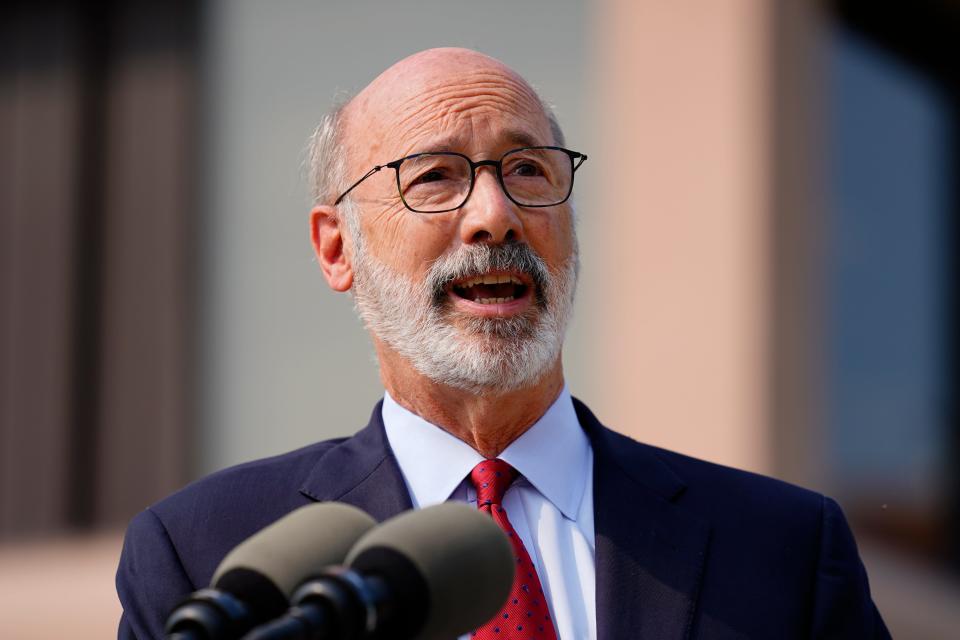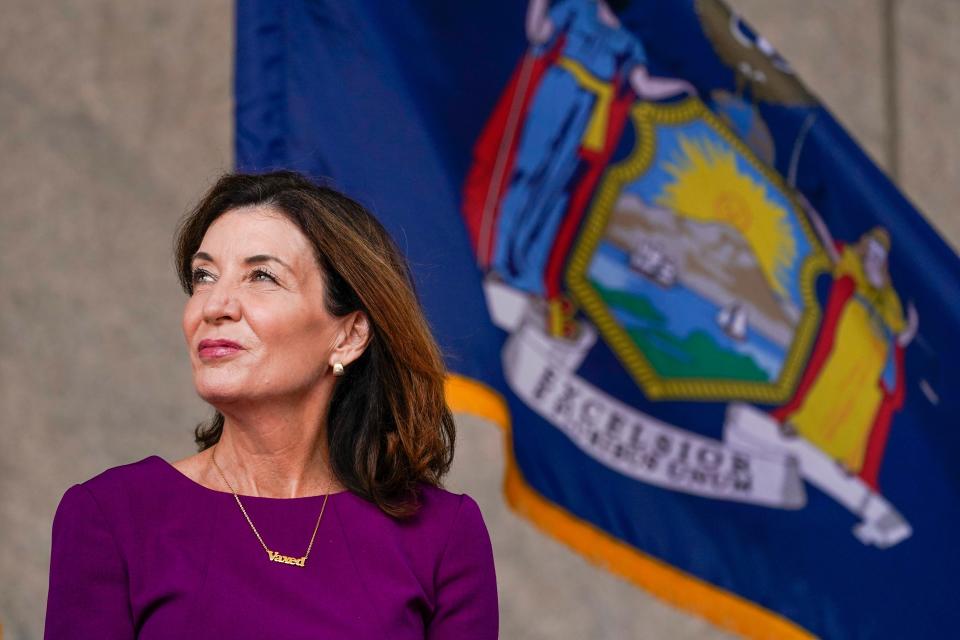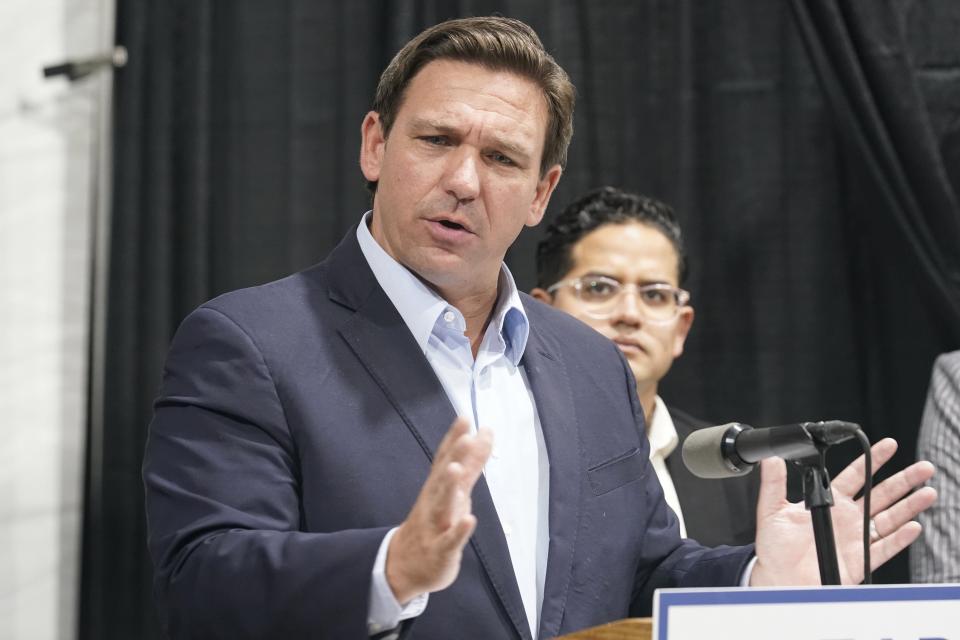U.S. governors in both parties struggle to fight delta variant with less executive power
The COVID-19 pandemic revealed and defined how governors could use their executive powers, and the backlash from voters and legislatures has shown how it can be curtailed.
As the delta variant surges across the country, governors who wielded largely unchecked mandates during the early days of the coronavirus are now struggling to respond to the public health emergency in its 18th month.
Because emergency declarations extend to more than just the coronavirus, U.S. governors have also been limited in their ability to respond to weather disasters, the ongoing opioid addiction epidemic and other crises.
Many governors now find themselves negotiating more with state legislatures, frequently controlled by the opposing party, who prefer public health decisions to be made locally rather than by state or federal leaders.
But it's not just opposing parties.
For example, Republican Ohio Gov. Mike DeWine has also been sidelined by the state's Republican-led Legislature. DeWine at a Sept. 14 news conference said he hasn't issued a statewide mask mandate amid Ohio's spiking cases because of restrictive legislation passed by lawmakers.

The power struggle between the executive and legislative branches is not new, but it has been exacerbated by a pandemic that became political and a contentious 2020 presidential election that is still being debated in some states.
Legislators in all 50 states have proposed bills to curb executive power since the pandemic began. At least 26 states have already pushed through laws that permanently weaken a governor's authority to protect public health, according to an analysis by Kaiser Health News.
"We have a crisis that should unite the country, but yet it divides the country," said Terry Madonna, a political analyst and pollster based in Lancaster, Pennsylvania.
"That’s how deeply rooted the partisan differences are. We are more divided now than any other time since scientific polling began."
Editorial: Gov. Mike DeWine must use political skills to institute life-saving school mask mandate
Power struggle in Pennsylvania

The Republican-controlled Pennsylvania Legislature has opposed Democratic Gov. Tom Wolf since he issued his first COVID mandate in March 2020.
The power struggle reached a crescendo in the May, when 52% of primary voters chose to limit executive emergency powers and give lawmakers more of a say in whether disaster declarations should be extended.
Republicans have criticized Wolf for making too many unilateral decisions during the pandemic and disagreed with school and business shutdowns. The majority party in the state Legislature has instead supported plans and policies that prioritize the economy.
Wolf has maintained that protecting public health was the best way to help the economy.
He recently clashed with Republican lawmakers again over a state mandate that orders students, teachers and staff to wear masks in Pennsylvania public schools.
Republicans argued that mandate bucked the will of primary voters who wanted the governor to have less power to issue such mandates. But the latest mask order in Pennsylvania didn't come from Wolf. It came from his Acting Secretary of Health Allison Beam.
Wolf said the order is necessary to protect children, especially those who are too young to be vaccinated. He first asked lawmakers to return early from their summer recess and respond to the surging cases of delta variant infections in children.
When that bipartisan effort failed, the Wolf administration issued the mandate.
"This is a necessary step to keep our students and teachers safe and in the classroom, where they all need to be and where we want them all to be," Wolf said during a news conference earlier this month. "Doing nothing right now to stop COVID-19 is not an option."
Republicans are now moving to strip the state Department of Health's ability to issue mandatory masking and social distancing orders. They are hoping they can get the effort passed through an amendment process much like they stripped Wolf's emergency powers with the primary results.
"Immediately surrendering to emotion is a sweeping and restrictive measure that will result in government control of our daily lives," Senate Majority Leader Kim Ward said in a statement. "While I believe Gov. Wolf’s efforts are well intended, his approach is not based on data nor does it consider the demographics, geography, and cultures across the Commonwealth."
Republicans plans to restrict the emergency powers of the state health secretary are "dangerous" and would further the spread of all contagious, deadly diseases, according to Wolf spokeswoman Lyndsay Kensinger.
"These extreme, political measures would actively allow the spread of over 110 communicable diseases, like meningitis and Ebola, within our communities and impact the department’s ability to protect Pennsylvanians," she said.
Beyond the health implications, legislating through state constitutional amendments is not good governing, and it could backfire on Republicans, according to Bruce Ledewitz, a law professor at Duquesne University in Pittsburgh.
"If you take away the ability to have mask mandates, the next time there's a Republican governor and secretary of health, they can't do anything about it," he said.
It would take another two-year process to amend the constitution.
"You cannot govern this way," Ledewitz said.
New N.Y. governor, less authority

Even in Democratic-controlled states, state legislatures have moved to curb governors’ COVID powers.
Last March, Democrats in the state Legislature in New York took aim at then-Gov. Andrew Cuomo, also a Democrat, amid scandals whirling around him. In addition to sexual harassment allegations that led to his resignation in August, Cuomo was also accused of underreporting COVID deaths in nursing homes.
So lawmakers stripped him of most of his executive powers to implement COVID restrictions, such as closing businesses or extending mask mandates, without first notifying the state Legislature.
But as the pandemic continues, new Gov. Kathy Hochul has sought to continue to install COVID protocols by using directives through the state Department of Health, such as requiring masks in schools and mandating teachers either get vaccinated or test out weekly.
The state is also requiring all health-care workers to get their first shot by Sept. 27, but a court fight is underway over whether New York can ban a religious exemption.
Hochul recognized that she’s limited in what she can do when she announced the measures in schools Aug. 24 as her first act as governor.
“I want everyone vaccinated. I don't have the authority. I don't have the same executive power that was in place last year. But if I did? Sure as I'm standing here, I would mandate it. But given the limitations I have right now, I want to make sure that everyone is,” she said of wanting to require vaccines for all school staff, as New York City is doing.
School fight: After NY punts, local school districts face COVID debate: To mask or not to mask?
A court battle in Wisconsin

In Wisconsin, Democratic Gov. Tony Evers at the beginning of the pandemic closed schools for two months and ordered people to stay at home. By that summer, he put in place a mask requirement.
His stay-at-home order and mask mandate were eventually overturned by the state Supreme Court. He does not have a clear way around those court rulings and has not attempted to reinstate the orders.
Republicans who control the state Legislature sued over the stay-at-home order and got a 4-3 ruling in their favor from the high court in May 2020. A businessman and prominent Republican donor challenged the statewide mask requirement and the court sided with him in a 4-3 ruling in March 2021.
The ruling, however, did not affect the powers of local governments and some communities in Wisconsin continue to have mask requirements. The state Supreme Court last month declined to hear a challenge to a mask requirement for Dane County, which includes Madison.
Evers has put his focus on expanding vaccinations and recently announced state employees who are not fully vaccinated will have to get tested weekly.
"As part of our efforts to manage the state workforce, we’re looking to every tool at our disposal to address the delta variant, including testing, wearing masks, and vaccination,” state Department of Administration secretary Joel Brennan said in a statement Sept. 14.
Republican Senate Majority Leader Devin LeMahieu called the policy an overreach and said he was exploring ways to stop Evers.
Some University of Wisconsin schools are requiring students and staff to wear masks indoors. Some Republican lawmakers have pushed to sue to stop that requirement, but so far legislative leaders have not filed litigation.
Vaccine incentive: Gov. Tony Evers creates a COVID-19 vaccine incentive program, giving $100 gift cards in exchange for the first shot
DeSantis faces pushback and Democratic challengers in Florida

In Florida, Republican Gov. Ron DeSantis has inveighed against mask and vaccine mandates as antithetical to personal freedom.
At the same time, the state accounted for 1 of every 26 COVID-related deaths reported in the world in the week ending Sept. 10, Johns Hopkins University data shows, with 2,448 deaths. And the state now ranks 10th among states where coronavirus is spreading the fastest per person.
But DeSantis, already facing Democratic challengers to his reelection in 2022, is getting pushback from local leaders, parents and businesses.
He’s now appealing a trial judge’s decision in state court that threw out his ban on mask mandates in public schools. Meantime, he’d directed the docking of pay of district superintendents and school board members who went against him as punishment.
DeSantis had ordered that counties allow parents to opt out of mask requirement for their children.
But in response to a lawsuit brought by parents from a half-dozen Florida counties, a judge ruled that school boards are empowered to mandate that all students wear face coverings, unless they get a medical exception. That order, however, is on hold till the appellate court decides whether to affirm or reverse.
"We look forward to winning the appeal and will continue to fight for parents’ rights," said Taryn Fenske, a spokeswoman for the governor.
The Biden administration responded with “a directed investigation" by the U.S. Department of Education's civil rights office, saying DeSantis’ lax mask policy may be discriminating against “students with disabilities who are at heightened risk of severe illness from COVID-19."
That’s not all: DeSantis signed a bill in May that banned vaccine passports, and the governor also is engaged in a legal fight against Norwegian Cruise Line, which sails out of Florida ports, and its requirement that passengers show proof of vaccination.
And most recently, DeSantis announced a $5,000 fine per employee against cities and counties that require vaccinations of their workforce.
He took aim at Biden’s announcement that the Occupational Safety and Health Administration was developing rules that require businesses with more than 100 employees ensure their employees are vaccinated or test them weekly for the COVID virus.
Already, that’s being tested by Florida’s Leon County, home to the state capital of Tallahassee, where DeSantis now resides in the Governor’s Mansion.
Its county administrator is flouting DeSantis’ edict, saying “political rhetoric continues to dangerously exacerbate fear and confusion about vaccinations."
New health leader: DeSantis announces new UF professor as Florida's next surgeon general
Candy Woodall is a reporter for the USA TODAY Network Pennsylvania Capital Bureau. She can be reached at 717-480-1783 or on Twitter at @candynotcandace.
This article originally appeared on USA TODAY NETWORK: US governors now have less power to fight COVID and other crises

 Yahoo Movies
Yahoo Movies 
